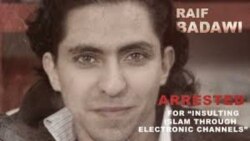Saudi Arabia’s Supreme Court has upheld the conviction of human rights activist and internet blogger Raif Badawi. In May 2014, Mr. Badawi was sentenced to 1,000 lashes, 10 years in prison, and a fine of one million riyal ($266,665) on charges of blasphemy and apostasy.
The charges were based in part on his founding of the Saudi Liberals Network, an online forum established to foster political and social debate in Saudi Arabia, and defend freedom of expression, women’s rights and gender equality.
On January 9, 2015, Mr. Badawi received his first round of 50 lashes in the public square in the city of Jeddah. After the international outcry that followed, Saudi authorities stopped the public lashings and ordered a review of his case.
Raif Badawi is being punished merely for daring to exercise his right to freedom of expression.”Amnesty International
Now that review seems complete, with the Saudi Supreme Court upholding the previous verdict. Amnesty International has called Badawi’s sentence “cruel and unjust,” declaring that “blogging is not a crime,” and that “Raif Badawi is being punished merely for daring to exercise his right to freedom of expression.” Mr. Badawi’s wife Ensaf Haider fears that the lashings will recommence shortly.
In a briefing to reporters, U.S. State Department Press Office Director Jeff Rathke said the United States is “deeply concerned” that the Saudi Supreme Court has upheld the sentence given to Mr. Badawi “for exercising his right to freedom of expression and religion:”
“As we had previously said back in January, the United States government continues to call on Saudi authorities to cancel this brutal punishment and to review Badawi’s case and sentence. We strongly oppose laws, including apostasy laws, that restrict the exercise of freedom of expression and we urge all countries to uphold these.”
In a recent speech concerning the importance of the role played by ordinary citizens engaged in the peaceful activities of civil society, President Barack Obama declared that all countries “benefit from open and tolerant and inclusive dialogue. And we should reject violence or intimidation that’s aimed at silencing people’s voices.”
Saudi Arabia is no exception to the President’s words. The sentence against Raif Badawi should not stand.


















